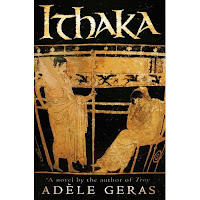
From StarMag, 29th January, 2006
Review by DAPHNE LEE
Getting a grip on reality
ITHAKA
By Adele Geras
Publisher: David Fickling Books, 416 pages
(ISBN: 0-38560-391-6)
WHAT do the wives and children, and mothers and sisters of heroes do while these brave warriors are off slaying monsters and overthrowing villainous rulers? Storytellers tend to focus on the action and the excitement, while ignoring the lives of those who must sit and wait and wonder.
But years, even decades, might pass before the return of a wandering hero. In the meantime, it is unlikely that his loved ones are doing nothing except twiddling their thumbs. Believe it or not, life goes on no matter how much a man, even one as glorious as Odysseus, is missed!
Ithaka tells the tale of those left behind by Greek mythology’s most cunning conqueror when he goes to fight the Trojans: There is his wife, sad and lonely Penelope; his son, Telemachus, who craves the love and guidance only a father can offer; Antikleia, his mother who, unable to bear the grief of losing her son, ends her own life early in the novel.
Like Antikleia, many fear him dead, but Penelope has been told by the goddess Pallas Athene not to despair. Her husband’s life is literally in her hands, bound up with the threads she uses on her loom. So long as she continues to weave her tapestry, telling the story of his long journey home with her coloured wools, all will be well.
At the very centre of this tale is Klymene, the granddaughter of Odysseus’ old nurse. She and her twin brother Ikarios are Telemachus’ playmates, but her feelings for the young prince are changing.
Love makes Klymene acutely aware of everything about her, and with maturity and her growing awareness, come the ability to see and recognise the gods and goddesses who walk the streets of ancient Greece, meddling with lives of man according to their whims and fancies: Fishy-breathed Poseidon promises calamity for the royal household, ostensibly in revenge for Odysseus’ treatment of his son, the cyclops Polyphemus; Artemis rewards Odysseus’ faithful hunting dog, Argos, by keeping him alive despite extreme age and injury; and Aphrodite causes Penelope’s loneliness to escalate into lust for a boyhood friend of Odysseus’.
Yes, there’s never a dull moment in Ithaka. Throw a band of horny and violent oafs into the mix and you have a soap opera ready to be screened at prime time on HBO! Most of the action is seen through Klymene’s innocent eyes and so life in Ithaka is only as wonderful, fearful or tedious at it may seem to an awkward, impatient and moody, yet courageous and compassionate teenager who is just getting to grips with the world around her.
Then there are the other adolescent characters: petulant Telemachus; love-lorn Ikarios; flirty, back-stabbing Melantho; and sensitive, sweet Mydon. Really, Ithaka could be subtitled The OC, B.C! This isn’t as bad as it may sound (to some): Ithaka is, after all, a young adult novel. So the story is rightfully presented from an adolescent point of view and Klymene and company’s very natural, hormonally-driven hopes, fears and preoccupations give it a touch of realism, making it relevant and interesting to a young audience, even one that may not be attracted to tales inspired by mythology.
Interestingly, Geras makes the reader care so much about the people whom Odysseus has left behind that, when he finally appears in the book, you really couldn’t care less. It’s the others whom you are anxious for and curious about and it’s Klymene whom you wish the best for.
Ithaka is her story. And, while Penelope and her husband claim their “happily ever after” at the end of the book, the young handmaid is left on the verge of womanhood, facing the endless possibilities life has to offer. If only Geras would give us a more of this brave, bright, loving girl. If anyone deserves an epic of her own, it’s Klymene